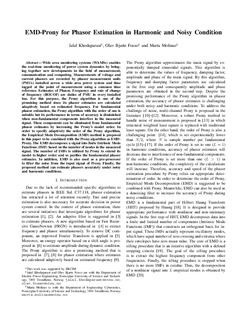EMD-Prony for Phasor Estimation in Harmonic and Noisy Condition
Chapter
Accepted version
Permanent lenke
http://hdl.handle.net/11250/2583402Utgivelsesdato
2018Metadata
Vis full innførselSamlinger
- Institutt for elkraftteknikk [2468]
- Institutt for teknisk kybernetikk [3741]
- Publikasjoner fra CRIStin - NTNU [38127]
Originalversjon
http://doi.org/10.1109/SPEEDAM.2018.8445263Sammendrag
Wide area monitoring systems (WAMSs) enables the real-time monitoring of power system dynamics by bringing together new developments in the field of measurement, communication and computing. Measurements of voltage and current phasors are recorded by phasor measurement units (PMUs) installed across a wide area power system and time tagged at the point of measurement using a common time reference. Estimates of Phasor, Frequency and rate of change of frequency (ROCOF) are duties of PMU in every installed bus. For this purpose, the Prony algorithm is one of the promising method since its phasor estimates are calculated adaptively based on estimated frequency. For fundamental phasor estimation, the Prony algorithm with the order of one is suitable but its performance in terms of accuracy is diminished when non-fundamental components interfere in the measured signal. These components can be eliminated from fundamental phasor estimates by increasing the Prony's model order. In order to specify adaptively the order of the Prony algorithm, the Empirical Mode Decomposition (EMD) method is proposed in this paper to be combined with the Prony algorithm as EMD-Prony. The EMD decomposes a signal into finite Intrinsic Mode Functions (IMF) based on the number of modes in the measured signal. The number of IMFs is utilized by Prony to extend its model to higher order and so purifies the fundamental phasor estimates. In addition, EMD is also used as a pre-processor to filter the noise from the input signal of Prony. Finally, the proposed method can estimate phasors accurately under noisy and harmonic conditions. EMD-Prony for Phasor Estimation in Harmonic and Noisy Condition
